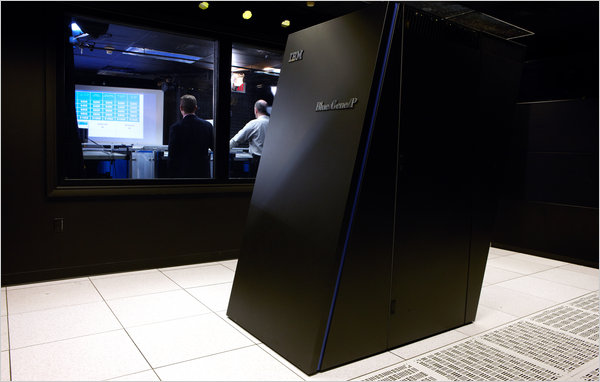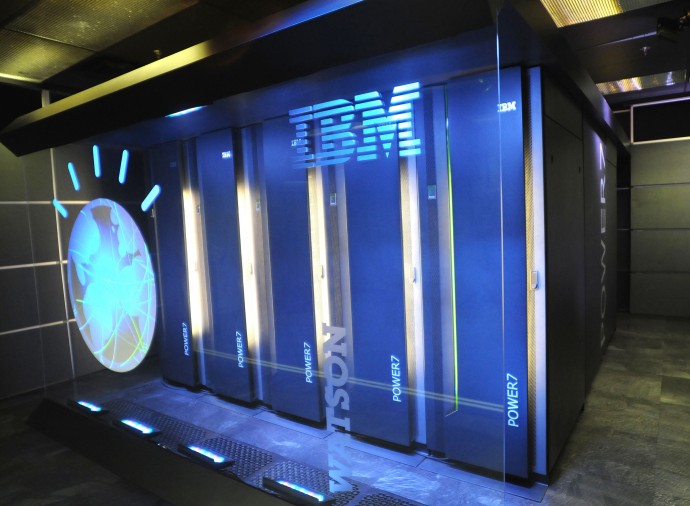"The younger brother" IBM Watson engaged in the analysis of patents
At Habré, IBM Watson, a self-learning computer scrabble, has been repeatedly discussed, which is able to answer questions by understanding an array of unstructured data. He showed his best side by winning several rounds of the Jeopardy quiz (“Own game”) against the champions of this game.
Then Watson went to medicine: began to analyze publications from the PubMed national medical base and dozens of textbooks. By May 2011, he had mastered the program of the college and the first year of the university, that is, he was able to correctly answer the questions of exams that medical students pass. According to the developers' forecasts, in three to five years, Watson will be ready for the first pilot tests to treat real patients, and in 8-10 years, such computers can be widely used in hospitals as a diagnostic tool. The first Watson commercial use contract has already been signed with WellPoint.
The diagnostic doctor is not the only profession where it is difficult for people to compete with automated systems for analyzing an array of unstructured data. There is another profession, albeit not so honorable. This is a lawyer, a specialist in patent law.
IBM has developed the Strategic IP Insight Platform (SIIP) system, which is offered to large corporations for the analysis and management of the intellectual property portfolio. The system carries out data mining in the entire patent database, analyzes the archive of scientific journals and other information on the topic, so that the owner of intellectual property can analyze and detect "problems" in his or her patent database.
SIIP was used to create a database containing records on medical patents, as well as biomedical journals and information on pharmaceutical preparations. This base is supposed to help in the development of new drugs.
From each article / patent / description, the SIIP system extracted the names of chemicals, diagrams, the names of scientists and inventors, and other keywords. To date, 2.5 million drug names, 4.7 million patents and 11 million journal articles from 1976 to 2000 have been processed. IBM donated part of the collected information to the PubChem open directory of drugs .
According to some expertsThe intelligent SIIP platform can be successfully used to combat patent trolls. Unfortunately, this option seems almost unrealistic, given that IBM itself receives the most patents in the world and is one of the richest owners of intellectual property, using its baggage of 10,000+ patents for absurd lawsuits. Worse, IBM is actively supporting software patents , and software patents are even more dangerous for IT companies than trolls .
So it’s unlikely that the artificial intelligence created by IBM will fight patent trolls. Quite the contrary - it can be used to generate even more patents. Or to createthe most powerful patent troll using AI, capable of generating an infinite number of “inventions”. Let us hope that such forecasts will never come true.
The SIIP platform is built on the same technologies as IBM Watson. Recall that Watson is an IBM POWER7 server, Apache Hadoop and Apache UIMA are used to process information, as well as a number of other programs created over four years by the IBM development team.


The machine is named after IBM founder Thomas Watson. In the future, it will become part of an artificial intelligence system capable of understanding human language and answering any questions, drawing information from the Internet. The ability to filter and analyze facts can be used in medicine (for making complex diagnoses empirically after analyzing the symptoms), automatic support services (for answering questions), travel guides and ... for generating patents, maybe.
Then Watson went to medicine: began to analyze publications from the PubMed national medical base and dozens of textbooks. By May 2011, he had mastered the program of the college and the first year of the university, that is, he was able to correctly answer the questions of exams that medical students pass. According to the developers' forecasts, in three to five years, Watson will be ready for the first pilot tests to treat real patients, and in 8-10 years, such computers can be widely used in hospitals as a diagnostic tool. The first Watson commercial use contract has already been signed with WellPoint.
The diagnostic doctor is not the only profession where it is difficult for people to compete with automated systems for analyzing an array of unstructured data. There is another profession, albeit not so honorable. This is a lawyer, a specialist in patent law.
IBM has developed the Strategic IP Insight Platform (SIIP) system, which is offered to large corporations for the analysis and management of the intellectual property portfolio. The system carries out data mining in the entire patent database, analyzes the archive of scientific journals and other information on the topic, so that the owner of intellectual property can analyze and detect "problems" in his or her patent database.
SIIP was used to create a database containing records on medical patents, as well as biomedical journals and information on pharmaceutical preparations. This base is supposed to help in the development of new drugs.
From each article / patent / description, the SIIP system extracted the names of chemicals, diagrams, the names of scientists and inventors, and other keywords. To date, 2.5 million drug names, 4.7 million patents and 11 million journal articles from 1976 to 2000 have been processed. IBM donated part of the collected information to the PubChem open directory of drugs .
According to some expertsThe intelligent SIIP platform can be successfully used to combat patent trolls. Unfortunately, this option seems almost unrealistic, given that IBM itself receives the most patents in the world and is one of the richest owners of intellectual property, using its baggage of 10,000+ patents for absurd lawsuits. Worse, IBM is actively supporting software patents , and software patents are even more dangerous for IT companies than trolls .
So it’s unlikely that the artificial intelligence created by IBM will fight patent trolls. Quite the contrary - it can be used to generate even more patents. Or to createthe most powerful patent troll using AI, capable of generating an infinite number of “inventions”. Let us hope that such forecasts will never come true.
The SIIP platform is built on the same technologies as IBM Watson. Recall that Watson is an IBM POWER7 server, Apache Hadoop and Apache UIMA are used to process information, as well as a number of other programs created over four years by the IBM development team.


The machine is named after IBM founder Thomas Watson. In the future, it will become part of an artificial intelligence system capable of understanding human language and answering any questions, drawing information from the Internet. The ability to filter and analyze facts can be used in medicine (for making complex diagnoses empirically after analyzing the symptoms), automatic support services (for answering questions), travel guides and ... for generating patents, maybe.
